Taking pride in cultivating a great team of dedicated people as well as giving back to their communities, Sunnking is a leader in the electronics recycling industry, focusing on ensuring that as much electronic material stays out of the landfill by recycling, repairing, reusing, and reselling items that move through their facility.
For more than two decades, electronics recycler and reseller, Sunnking, has been a leader in the electronics recycling industry. Its origins began in the 1990s at a recycling facility at Kodak’s campus in Rochester, NY. The facility was a joint venture between two Buffalo companies—Manitoba Corporation and United Alloys—called Integrated Recycling. One of the managers of Integrated Recycling that they hired to operate on the Kodak campus was Duane Beckett, who was seeing the items that were coming into the scrap pile and thought to himself that some of the material being put into a normal scrap pile could have some resale value. Beckett left Integrated Recycling in 1998 and created Sunnking, incorporating the company in 2000. At the beginning, the basis of the company was to find and sell reusable assets, such as discarded corporate items that still had life left in them. He would pick them up, clean them, and resell them. It was still early in the electronics recycling space, but Beckett saw the potential and first started dealing with Kodak and Xerox in Rochester. He eventually built up the company enough that he was able to get a facility, a truck, hire people, and start doing pickups. Twenty-three years later, Sunnking is one of the largest electronics recyclers in New York state and the focus today is still very much resale and reuse; however, the volumes have grown so much that the majority of what the company does by volume is recycling. While Sunnking has some dismantle lines, the majority of the product lines that are not right for resale go through a shredding system, where the parts are separated into the different materials and sent out for refining.
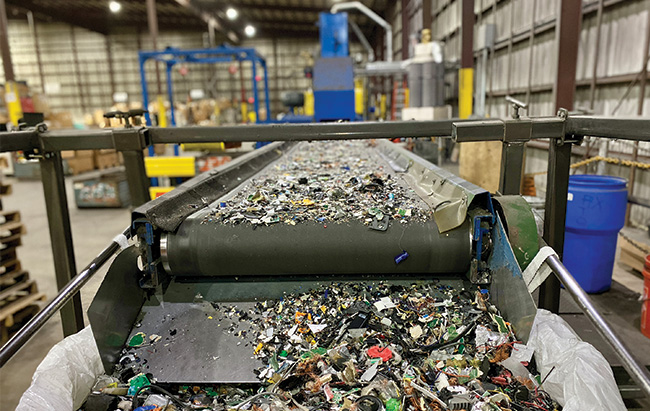
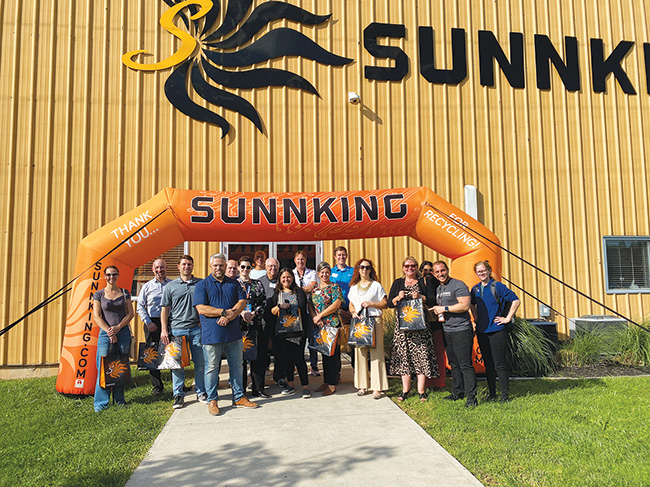
Photos courtesy of Sunnking.
In 2010, an EPR law passed in New York state where the manufacturers are responsible for free and convenient recycling, so in 2010, they made the decision to move into the residential space, creating a partnership with several private businesses and municipalities throughout the state, collecting the electronics on Sunnking’s behalf. Once the partners had a set number of pallets to dispose of, they would call Sunnking and they would do a pickup on their behalf. “Today, residential volume is approximately 45 percent of our business and 55 percent is commercial. When residential material comes in, it is generally not right for resale, so it is sent to get ready for recycling; however, we do have people who are sorting and looking at the material for anything that potentially might have reuse. The business material that comes in has a much higher likelihood of reuse, so that goes to a special team of people who really know various items,” says Adam Shine, President of Sunnking “We not only take care of laptops, PCs, monitors, etc., but we also handle lab equipment and industrial controls, consumer goods, DJ boards, drones, powered scooters, and more—you name it, we have seen it.” If an item is deemed as having a resale value, it is tested, and if it needs a part, Sunnking will order it and repair it. Then, the item is either sold through the company’s wholesale platform, online sales channels, or it goes to one of their two brick-and-mortar retail stores—one in Rochester and one in Utica. If the device does not have resale value, but there are still components within the device that do, it is sent to recycling. Once the material goes through the shredder, it goes through a ring mill, then magnetic separation and picking. Ultimately, the resultant material goes to one of several refiners throughout the world. “We have one that we work with in North America, once in France, and several in Asia. They will capture the gold, the copper, the silver, and the palladium out of the circuit boards and wires that are in that mix, and they capture those precious metals, where they get remade into certain products without having to mine the materials,” explains Shine.
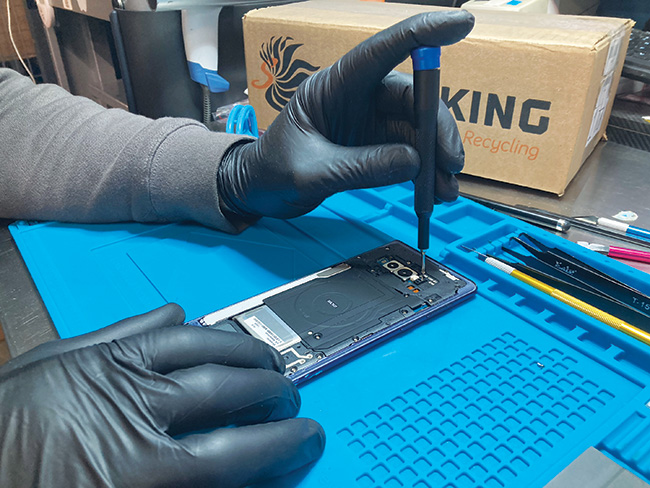
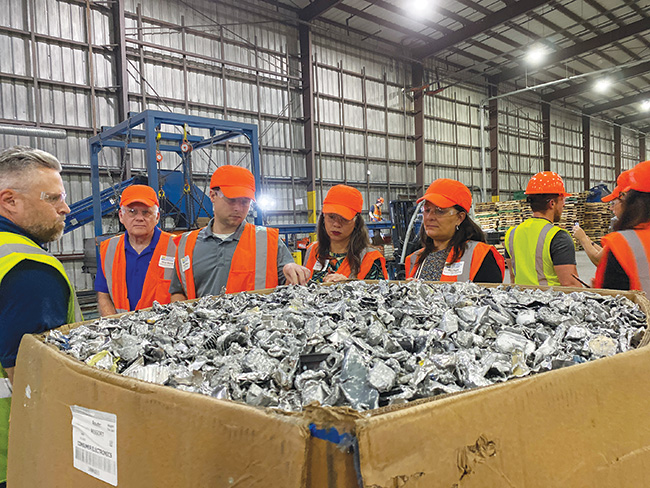
Much of the work Sunnking does is in Northeast, but the company has collected from as far as out as California, depending on the type of material and the volume. Currently, Sunnking has contracts pulling material from the Las Vegas area, Indiana, Texas, and California. Says Shine, “Wherever possible, we try to return value back to our commercial customers when they are providing us with resaleable units because there is a substantial margin in that part of the business. We can even collect commercial material from Canada because it is higher value, and you can easily overcome the freight costs. For the western part of the country, we work direct using third-party freight. We have worked with partners and, likewise, people contact us when they have something in our neighborhood as well. One of the great things about this business is that there is enough volume to go around. I find it unique that businesses are willing to work together and do it in a fully transparent manner.”
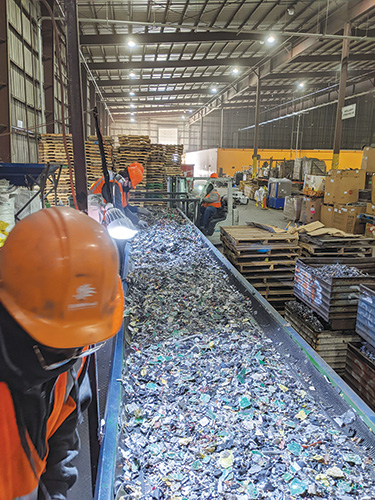
warehouse in New York
Dealing with Change
When the pandemic started, Shine expressed that the company was not sure what life would be like, especially business. Thankfully, as time went on and they learned more, there was some government funding that absolutely helped. Sunnking was also deemed an essential company since they are a recycler. “We were very fortunate. During the pandemic, we saw volumes were considerably down; people were not recycling as much because they were worried about other things, but we had a lot of back stock of material for sale and when the pandemic hit, there was a real need for electronics because so many people shifted to work from home and schools went to remote learning. That really carried the day for us since we weren’t seeing a lot of recycling material coming in. We were able to move resale units,” says Shine.
While the resale market was really hot during the pandemic, post-pandemic has seen a major cooldown in markets and resale has plummeted to below pre-pandemic levels, so the company has had to overcome that challenge. However, they are shredding and recycling more than ever and that is helping because commodity values are at a good number, and they can balance some of the offset of the down retail market with increased commodities that they are producing. Shine states, “The reality is that it was bound to happen at some point because technology is changing at such a fast pace, and it is so expensive. Where people used to upgrade their phone, tablets, etc. every year or every two years, there are no impressive new technologies that are being built into the new units, so people are holding onto things much longer. Couple that with the rising interest rates and the cooling of the economy and I think you’ve seen less investments in technology, which means less units, and less value for the units that are out there.”
Coming out of the pandemic, Sunnking started to have major labor shortages. So, the company had to get creative, such as raising wages and creating certain incentive programs within the company. “We have a really fantastic culture here—more of a family atmosphere than a work atmosphere,” Shine points out. “Some of the things we do are buy swag for the company—sweatshirts, water bottles—at least twice per year, we just launched a website with several different items on it and people can go on there and pick one item and the company pays for it, we hold pizza Fridays once per month, food or ice cream trucks come in once per quarter, we have a summer BBQ, and we provide good healthcare. I want to make sure that we are taking good care of our employees.” Most recently, the company considered changing over to a four-day work week and as the idea gained more steam, Shine thought of the idea as something very progressive, stressing that the company is always willing to try new things. So, on February 6, 2023, Sunnking transitioned to four 10-hour workdays. “We had a lot of discussion and polling internally and it seemed, for the most part, that there was enormous support for it. Now, that we’ve been doing it, we haven’t had any negative feedback, people seem to love it. They have an extra day with their families and save gas money; there are so many reasons that we did it and so many benefits with our employees. Everyone is very pleased with it. It has increased morale as well.”
Focusing on Safety
Sunnking has always had great emphasis on safety, holding safety tool talks every month focusing on a different topic with the safety committee. The group walks around the facility and talks about safety-related issues and what they can do to improve upon them. Shine stresses that it is very important that people come in and leave in the same condition. “They have families and like anyone else here, I don’t want to walk on the floor and see safety hazards that could potentially cause accidents. We do a very good job with safety—we focus on it, talk about it, there is orientation that people go through, there are monthly safety meetings, and we also get together quarterly as part of our R2 standard to talk about how we are doing, our annual goals, and how we are tracking against those.”
Lithium-ion batteries come from all material streams collected. Shine explains that 50 percent of the material that they are shredding contains a battery and must have someone go through it and take out the battery. When material is sent to dismantle knowing that it is going to be shredded, the idea is to break it open quickly and remove the battery, Sunnking has a battery recycling department that is responsible for sorting the different types of batteries, taping the terminals and then sending them off to a battery recycler. “We are constantly dumping a lot of material on a line and our guys are pulling out battery container devices, which then get sent to a dismantler to remove the batteries, so we don’t have thermal events during shredding. We do a very thorough job. Every device that goes into the shredder has had at least four eyes on it to make sure there are no batteries,” stresses Shine.
While Sunnking has had a few thermal events over the years, the company does have a safety protocol, including fire extinguishers throughout the line, and tools to grab a smoking battery and put it into a bucket with a liquid in it that will extinguish it. They have also had issues with smoking batteries, where they have had to evacuate the building because of the smell. Shine says, “While we try to limit the events whenever possible, every one of them is a learning opportunity. We look back at what caused it and who missed it, and it becomes a training tool.”
Training is a constant focus as well. Two years ago, Shine received a call from a company called Manage Assist. This company helps write grants for training. After going through the writing process with them, Manage Assist submits the grant proposal to the state on your behalf. If you are awarded the grant, you can do training with anyone, but if you use Manage Assist, you do not pay for the grant writing process, assuming you hit certain milestones. “After a two-year process, we ended up being awarded a grant and now, every Wednesday for the whole year, we have all day training. We pull people from the floor, trying not to disturb production, but also realizing that we are making a serious investment in all of our employees. We have a trainer who holds multiple training classes geared towards things like management, lean manufacturing, 5S, and other various topics, and we have employees that will learn in two-, four-, or eight-hour training sessions. It has been fantastic. The morale is up. People feel incredibly included and empowered. They realize that the company is making an investment in them. I am really excited about it. It has been rewarding for me to hear and see the feedback about the amount of time and effort the employees are putting into it. I know as a company we are going to benefit from it in the long run,” says Shine. Anytime there is an opportunity for advancement, Sunnking always looks at internal employees first. There is a lot of opportunity for growth at the company. “People come in and work hard for us every day. They are loyal and care just a little more because we are giving them the tools and showing that we want them to be part of the process. They are not just a number; we want them to be woven into the fabric of what we do every day.”

A Reflection of the Community
Serving the community from a recycling perspective, Shine believes that it is important to give back, so Sunnking participates in many different charitable events. The one he is most proud of is their participation in Camp Good Days and Special Times. This is an organization that services children that either have cancer or have been affected by cancer (a parent or sibling was diagnosed). “It is an incredible organization and one that I have put a lot of time into personally,” he says. “The summer camp lets these kids have fun and forget about all the exterior noise that is going on their lives. We do a large benefit for them every year.” In 2009, Shine was introduced to the Executive Director of Camp Good Days. Sunnking was looking for some community involvement and they came up with the idea of e-scrap for camp. Companies throughout New York (focused mainly in Buffalo and Rochester) sign up for the program and they collect electronics from their employees. For example, Sunnking will work with a bank, delivering boxes to collect material in and their employees are encouraged to bring any recyclables that they have from home. Every company participates for one week and Sunnking provides marketing materials to hang up around the office. Those items are brought back to the facility and Sunnking donates for every pound received. “We started in 2010, so over 12 years, we have raised $140,000 dollars (approximately $12,000 to $14,000 donated per year). It has become a part of Camp Good Days’ annual budget and they are thankful for it. That’s one we are most proud of. To see how it touches lives is amazing,” says Shine. The company has also provided free electronics, worked with the Boys and Girls club, become a sponsor for the Make a Wish gala, and participated in many other events. “Community involvement is very important to us,” he stresses. “At the end of the day, we are a reflection of our community, so to be able to benefit our community and our people and have them buy into these things, it has been fantastic to witness and be a part of the process. The Camp Good Days check is the best one that we write all year. It is really rewarding to be in a position to give back to the community. It is something that we love to do.”
Sunnking often does Saturday collection events where they advertise, register, and hold an event in one area for four to five hours collecting electronics. It has become really detail oriented and has taken on a life of its own. Based on the number of cars registered, they collect the data on what the average pounds are per car, no-show rates, etc. Scheduling people in 15-minute increments, they are able to control the line and the number of people in an area in a specific period of time. “When we started registering people in 2020, 136 pounds per car was the average collection rate, now it is below 100 pounds, with a typical no-show rate at 15 to 20 percent. Our events are very well orchestrated, very well set up, tons of planning go into them, and we usually invite an elected official to come and work with us. We do that because they will send out flyers to their constituents. When people tend to get mail from their elected officials, they look at it. Couple that with a free recycling event, and we get a really good turnout. It has been a nice angle to get people involved and they very much appreciate the service,” says Shine. Recently, the number of events has been reduced due to the change in New York state’s EPR law this year. “Previously, it was a shared responsibility model because the manufacturers were giving some funding to the collection sites we were working with and then we were paying for some items like tube TVs because they are expensive to recycle. In other words, the manufacturer’s amount was not covering the full cost of recycling,” he explains. “This year, there were specific language and regulatory updates where no charges of any kind are to be leveraged by anyone other than the manufacturers. Everything is on the manufacturer—they are 100 percent responsible for paying for the recycling. The collection sites can no longer be charged. They did step up in a big way and understood that they needed to do more. We’ve got some really great relationships and I am very appreciative.” Now that it is free across the board, Shine is not sure if the events are going to have as much of an impact because people have more opportunities for free and convenient recycling, and they do not need to hold as many collection events. “We just had our first event this year, and the early indication is that it is down from where we expected it to be, but we are going to do two more events and see how it goes.”
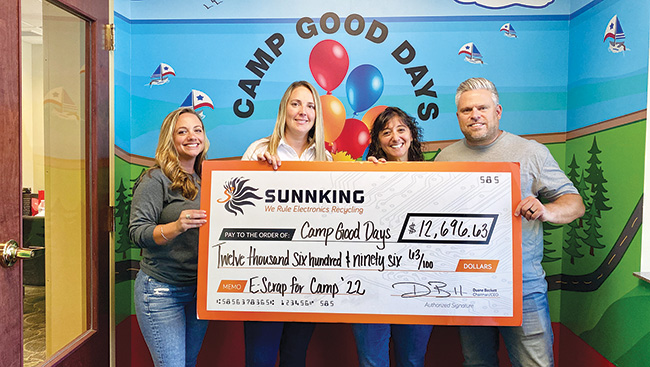
Market Shifts
Currently, Sunnking is challenged by the state of the resale market. While Shine says that they are doing fine, they have increased volume on the recycling side, and the more volume that they can push, the better the markets are, and the better they can do as a company. One area where they are really expanding is reselling more and pushing more products as well as volume since the margins on resale are far better than they are with recycling. He also points out that batteries are an ongoing challenge. “Some of the material and equipment that we are receiving are getting smaller, which makes it harder to easily extract the batteries. The other thing is we are getting new items in that are very difficult to recycle, such as wireless earbuds—each one has a battery in it and the case has a battery in it, so it is tremendous labor to get those out. I see a potential shift happening in the market where recycling becomes a no cost item. Much like the recyclables at your curb, you pay for those whether you are paying direct or through taxes. I can see electronic recycling going that way as well because these items are harder and harder to recycle. We also receive recycling where there are concerns with the data. If it is a laptop or a desktop, it is easier to remove the data, but then there are smart watches where there is really no great way to wipe the data off them. You could do a factory reset, but that does not really wipe the data effectively. New types of data containing devices come in every day, and we want to make sure we don’t miss those because a huge component of what we do is data privacy, so those are some of the challenges that we are seeing and experiencing.” He explains that another issue is that the Basel Convention out of Geneva passed a new proposal that controls the export of electronics and that is concerning because a lot of the refining material that they deal with could fall under the new Basel annexes that will disallow electronics recyclers to ship certain materials overseas. “Because the U.S. is not a part of Basel, we will not be able to work with any companies that are party to Basel. And any country that does that participate with Basel, we will have to do the pick prior to the consent form process before sending to them. That new rule is going into effect January 2025, so everyone is trying to figure out what that is going to look like, and it will have huge ramifications on the electronics recycling space as well.”
Future Plans
For now, Sunnking is focused on upgrading their shredding line and working on buying equipment that is going to help them achieve that goal. It will ultimately create cleaner streams of material, so they are able to get a higher value. Currently, some of the material they are sending to refineries has plastic in it and the company is working on getting the plastic out because the plastic itself has value as well. Shine says their other goal is to look at opening their first facility outside of the state of New York and would like to ideally have something in place by the end of 2024, if not sooner. “We are thinking likely in the Midwest, but we are still scouting out locations and are excited about that process as well.”
Shine emphasized that he is most proud of the team at Sunnking. “We have cultivated a great group of people here. I feel so good about what we are doing. I love to be surrounded by our employees and they energize me to want to push this company forward as far and as fast as I can so everyone can benefit.” | WA
For more information, call e-mail [email protected] or visit www.sunnking.com.
**Sunnking will be featured in an exhibit at the Smithsonian in Washington, DC opening in June! A “temporary” exhibit that will be open for about three years focusing on the history and environmental impact of cell phones, Sunnking sent them nearly 1k locally recycled cell phones, old and new, to be broken down. The exhibit will also feature profiles on two of their employees. For more information, visit www.si.edu/newsdesk/releases/new-smithsonian-exhibition-explore-unseen-connections-cellphones.
